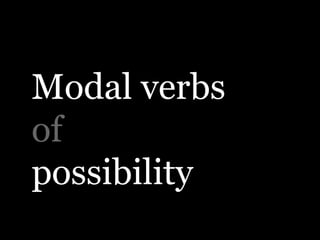
PowerPoint explaining the modal verbs of possibility
- 2. can will shall may must could would should might -
- 3. It can rain a lot in Rome in November.
- 4. It can rain a lot in Rome in November. sometimes it rains a lot
- 5. He can arrive very late.
- 6. He can arrive very late. sometimes he arrives very late
- 7. compare:
- 8. It may rain this evening.
- 9. It may rain this evening. it’s possible that it’ll rain
- 10. He may arrive late.
- 11. He may arrive late. it’s possible that he’ll arrive late
- 12. It can rain a lot in Rome in November. It may rain this evening.
- 13. It can rain a lot in Rome in November. It may rain this evening. present repeated possibility
- 14. It can rain a lot in Rome in November. It may rain this evening. future one-time possibility
- 15. N.B.
- 16. requests / permission possibility can Can I have… ? It can rain… may May I have… ? It may rain…
- 17. requests / permission possibility can Can I have… ? It can rain… may May I have… ? It may rain… can = may can ≠ may
- 18. When requesting or asking for permission, can and may play the same role. But regarding possibility, can reflects the possibility of something to happen based on past experiences; whereas may doesn't need evidence from the past.
- 19. may / might / could
- 22. It may might could not rain later. don’t use ‘could’ in negatives meaning ‘maybe not’
- 23. contrast with the indicative (a sentence that indicates something will happen without the modal verbs of possibility.)
- 24. It can rain a lot in Rome in November. It rains a lot in India in July.
- 25. It can rain a lot in Rome in November. It rains a lot in India in July. sometimes
- 26. always It can rain a lot in Rome in November. It rains a lot in India in July.
- 27. It can rain a lot in Rome in November. It’s raining a lot this month.
- 28. It can rain a lot in Rome in November. It’s raining a lot this month. sometimes
- 29. this time It can rain a lot in Rome in November. It’s raining a lot this month.
- 30. I may play tennis with John later. I’m going to play tennis with John later.
- 31. I may play tennis with John later. I’m going to play tennis with John later. it’s possible
- 32. it’s my intention I may play tennis with John later. I’m going to play tennis with John later.
- 33. We may watch the match this evening. Perhaps / maybe we’ll watch the match this evening. it’s possible -modal-
- 34. it’s possible -adverb- We may watch the match this evening. Perhaps / maybe we’ll watch the match this evening.
- 35. these sentences express ‘possibility’ convert them to modal sentences using may and might the meaning is always ‘possibility’
- 36. indicative etc modal may / might It’s possible that he has a car. He may ... He probably doesn’t understand. He … Perhaps she wants to dance. Maybe they are asleep. Perhaps he can’t see us. It’ll probably be a nice day. It probably won’t be a nice day. Perhaps it won’t happen. Maybe she loves him. Maybe they’re at home.
- 37. indicative etc modal may / might It’s possible that he has a car. He may have a car. He probably doesn’t understand. He might not understand. Perhaps she wants to dance. She may want to dance. Maybe they are asleep. They might be asleep. Perhaps he can’t see us. He may not be able to see us. It’ll probably be a nice day. It might be a nice day. It probably won’t be a nice day. It may not be a nice day. Perhaps it won’t happen. It might not happen. Maybe she loves him. She may love him. Maybe they’re at home. They may be at home.
- 38. introduce or remove ‘possibility’ in these sentences convert indicatives to modal sentences and modals to indicatives.
- 39. indicative etc modal may / might I’m going to buy a phone. I might buy a new phone. He needs … He might need some help. She doesn’t want to study. She … We might be able to pass the exam. It isn’t going to rain. She may be angry! They are hungry. I might have a pen you can borrow. He certainly knows the answer. She may like to go shopping.
- 40. indicative etc modal may / might I’m going to buy a phone. I might buy a new phone. He needs some help. He might need some help. She doesn’t want to study. She may not want to study. We are able to pass the exam. We might be able to pass the exam. It isn’t going to rain. It might not rain. She will be angry! She may be angry! They are hungry. They may be hungry. I have a pen you can borrow. I might have a pen you can borrow. He certainly knows the answer. He might know the answer. She wants to go shopping. She may like to go shopping.